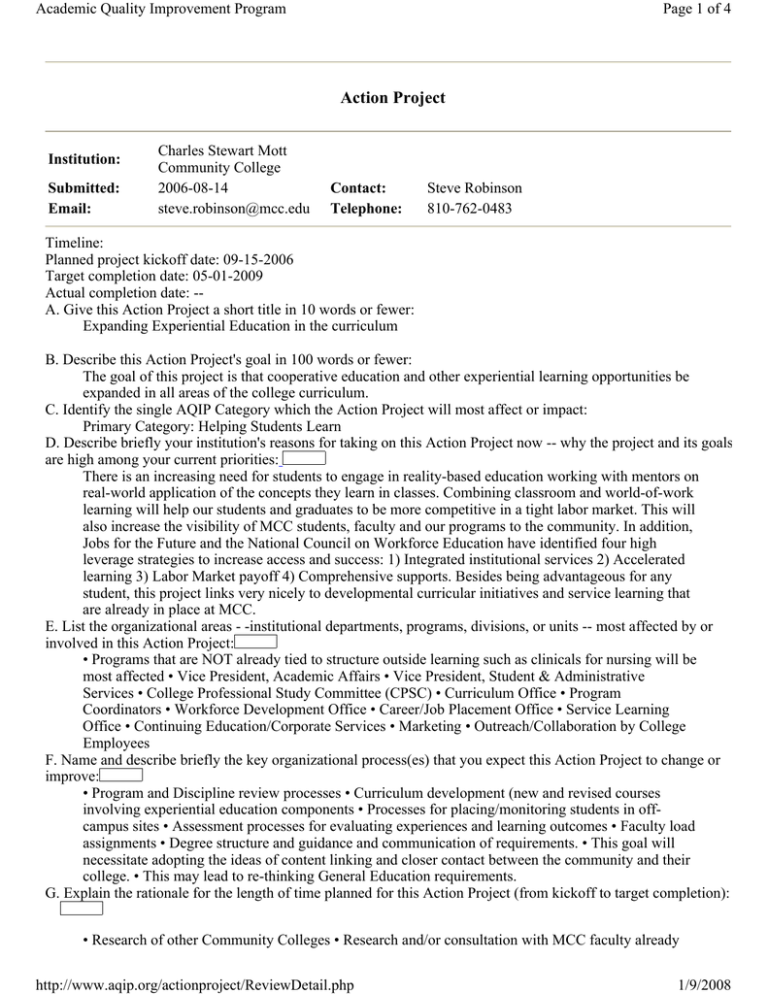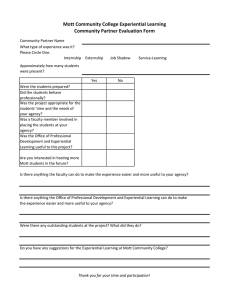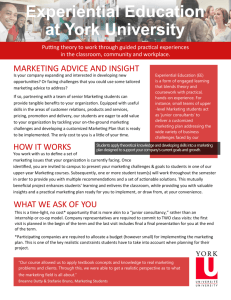Action Project
advertisement

Academic Quality Improvement Program Page 1 of 4 Action Project Institution: Submitted: Email: Charles Stewart Mott Community College 2006-08-14 steve.robinson@mcc.edu Contact: Telephone: Steve Robinson 810-762-0483 Timeline: Planned project kickoff date: 09-15-2006 Target completion date: 05-01-2009 Actual completion date: -A. Give this Action Project a short title in 10 words or fewer: Expanding Experiential Education in the curriculum B. Describe this Action Project's goal in 100 words or fewer: The goal of this project is that cooperative education and other experiential learning opportunities be expanded in all areas of the college curriculum. C. Identify the single AQIP Category which the Action Project will most affect or impact: Primary Category: Helping Students Learn D. Describe briefly your institution's reasons for taking on this Action Project now -- why the project and its goals are high among your current priorities: There is an increasing need for students to engage in reality-based education working with mentors on real-world application of the concepts they learn in classes. Combining classroom and world-of-work learning will help our students and graduates to be more competitive in a tight labor market. This will also increase the visibility of MCC students, faculty and our programs to the community. In addition, Jobs for the Future and the National Council on Workforce Education have identified four high leverage strategies to increase access and success: 1) Integrated institutional services 2) Accelerated learning 3) Labor Market payoff 4) Comprehensive supports. Besides being advantageous for any student, this project links very nicely to developmental curricular initiatives and service learning that are already in place at MCC. E. List the organizational areas - -institutional departments, programs, divisions, or units -- most affected by or involved in this Action Project: • Programs that are NOT already tied to structure outside learning such as clinicals for nursing will be most affected • Vice President, Academic Affairs • Vice President, Student & Administrative Services • College Professional Study Committee (CPSC) • Curriculum Office • Program Coordinators • Workforce Development Office • Career/Job Placement Office • Service Learning Office • Continuing Education/Corporate Services • Marketing • Outreach/Collaboration by College Employees F. Name and describe briefly the key organizational process(es) that you expect this Action Project to change or improve: • Program and Discipline review processes • Curriculum development (new and revised courses involving experiential education components • Processes for placing/monitoring students in offcampus sites • Assessment processes for evaluating experiences and learning outcomes • Faculty load assignments • Degree structure and guidance and communication of requirements. • This goal will necessitate adopting the ideas of content linking and closer contact between the community and their college. • This may lead to re-thinking General Education requirements. G. Explain the rationale for the length of time planned for this Action Project (from kickoff to target completion): • Research of other Community Colleges • Research and/or consultation with MCC faculty already http://www.aqip.org/actionproject/ReviewDetail.php 1/9/2008 Academic Quality Improvement Program Page 2 of 4 engaged in experiential learning, service learning, community development, etc. • Identify motivating factors for employers, agencies and organizations • Develop a common understanding of key terms and concepts (i.e. “service learning,” co-op,” “experiential,” “intern,” “extern,” “credit for prior learning,” “credit for life experience,” “field experience,” etc.) • Potential for degree and program revisions • Need for increased guidance and implementation plans. • Prototype period • Course changes and connections to initiatives that are already underway H. Describe how you plan to monitor how successfully your efforts on this Action Project are progressing: • Establish timeline and document progress/completion for actions • Monitor how many and to what extent faculty are involved in reviewing/revising existing courses and/or creating new courses • Documenting the number of relationships and levels of involvement • Enrollments • Establish a central repository of information concerning experiential credit and non-credit activity I. Describe the overall "outcome" measures or indicators that will tell you whether this Action Project has been a success or failure in achieving its goals: • Establishing baseline numbers of courses with experiential components, and then measure increases – at a particular rate such as “increase of 5%”? • Identify means to assess student learning outcomes in experiential situations • Measure how many employers we have formal and informal agreements with • Surveys of student/faculty/employer satisfaction rates • Establish baseline numbers for service learning experiences • Where appropriate, measures of student and/or participant employment J. Other information (e.g., publicity, sponsor or champion, etc.): • Employer contacts • Increased documentation and publication of student’s success • Idea for a promotional campaign: student profiles of those who've used such a program and how, as well as employers and/or community groups • Program Advisory Committees K. Project Leader and contact person: Contact Name: Steve Robinson, AQIP Coordinator Email: steve.robinson@mcc.edu Phone: 810-762-0483 Ext. Annual Update: 2007-08-20 A. Describe the past year's accomplishments and the current status of this Action Project. The Experiential Ed/Co-Op Team has defined the current state of experiential education at MCC and completed some analysis of the current situation, including: • Identified credit, non-credit, workforce development, and continuing education/corporate services as four areas of “curriculum” focus for the project • Defined terms related to experiential education, curriculum, co-op, etc. • Produced an inventory of credit courses with co-op, internship, externship, and practicum experiences • Begun to inventory non-credit experiential opportunities and external relationships and sources for experiential ed • Preliminary discussion of an improvement theory, i.e. a need for alignment of co-op and experiential ed opportunities across all divisions and departments • Discussed the need for a “clearinghouse” to match students (credit, non-credit, workforce development, and continuing ed) with opportunities • Researched and acquired institutional membership in Michigan Council for Internships and Cooperative Education. Review (12-19-07): The main work of the past year on this project focused on building a taxonomy of experiential learning, and attending to the current state of such learning at MCC. There was also some preliminary work done on improvement theories [AQIP category (8) Planning Continuous Improvement.]. Besides AQIP category (1) Helping Students Learn, which is the main category for this action project, the team worked across a range of departments on experiential learning at MCC, http://www.aqip.org/actionproject/ReviewDetail.php 1/9/2008 Academic Quality Improvement Program Page 3 of 4 and this work aligns well with AQIP category (9) Building Collaborative Relationships. Fact-finding, study and research have marked this phase of the action project, which is one of the ten AQIP principles of high performance organizations. B. Describe how the institution involved people in work on this Action Project. The Experiential Education/Co-Op Team has engaged the college community in a number of important ways, including: • Survey of all faculty (both part-time and full-time) to describe current experiential activities in all college courses • Engaged both the credit and non-credit areas of the college in investigating and researching the topic; 2 sponsors represent the academic and non-credit areas • Developed a rich body of web-based resources on the team’s work processes, including meeting minutes, agendas, resources from other institutions, etc. on the central AQIP web site; demonstrations of these web-based resources to internal college groups including supervisors, managers, etc. Review (12-19-07): As noted in the review for Section A, collaboration appears to be a key feature of this action project. Especially commendable in this regard is the team’s efforts to engage the credit and non-credit sides of MCC in this study and fact-gathering stage of the project. The team’s efforts to communicate its findings and share resources in common with the entire campus are also commendable and align well with AQIP category (5) Leading and Communicating. C. Describe your planned next steps for this Action Project. All MCC Action Projects periodically rate their progress along the seven CQI steps. The Experiential Education/Co-Op Team is currently at Step 3, Analyze Current Situation. Upcoming planned steps include: • Development of a shared “lexicon” or “Glossary” of experiential education/co-op related terminology based upon current MCC practices and existing information from professional organizations, etc. • Begin to form an improvement theory (Step 4) Review (12-19-07): Using the seven CQI steps to track the progress of work on this action project is useful and commendable. The Experiential Education/Co-Op Team reports that it is now at step three of the seven steps, “Analyze Current Situation.” It would be helpful to know where this step three is in relation to the plan to monitor this project’s progress that MCC put forward at the start of this action project. Among other things that initial plan called for setting a timeline for the project, presumably with set milestones for completing key elements of the project. Perhaps the team could set up a crosswalk between the seven CQI steps and the timeline and events set forth in the beginning of this action project. D. Describe any "effective practice(s)" that resulted from your work on this Action Project. While the Experiential Education/Co-Op Team is still working in the early analysis phase, the following effective practice may be of use to other institutions • Designed and deployed a survey to identify experiential opportunities, generic enough to be useful to other institutions; a copy of the survey and results is archived on the Team’s section of the MCC AQIP web page. Review (12-19-07): The AQIP community of institutions is grateful to have access to the survey MCC created that identifies experiential opportunities. Sharing such resources in common with other educators is another example of how your work aligns with AQIP category (9) Building Collaborative Relations. E. What challenges, if any, are you still facing in regards to this Action Project? The Experiential Education/Co-Op Team needs more regular involvement and attendance by Team http://www.aqip.org/actionproject/ReviewDetail.php 1/9/2008 Academic Quality Improvement Program Page 4 of 4 leaders. In addition, future challenges include: • Expand discussion beyond service learning • Finish Step 2 with a body of defined experiences as a “baseline” • Keep in touch with Sponsors to define “boundaries” of any proposed coordination/clearinghouse for experiential ed and co-op • Retirement of one team leader • Two team members elevated to team leader status • The Team must work to maintain a standing schedule of meetings, tasks, and deadlines with attendance by all team members Review (12-19-07): The challenges faced by the Experiential Education/Co-Op Team as it proceeds include securing regular team-leader participation, engaging more discussants on experiential learning, organizing and deploying the information it has gathered, sustaining relations with Sponsors, and changes in team membership. The team is well positioned to meet these challenges successfully given its successes to date. Based on this action project update, the Experiential Education/Co-Op Team seems adroit in building solid, collaborative relations and making people feel valued. Such skills will prove valuable in dealing with the challenges before the team. F. If you would like to discuss the possibility of AQIP providing you help to stimulate progress on this action project, explain your need(s) here and tell us who to contact and when? Review (12-19-07): http://www.aqip.org/actionproject/ReviewDetail.php 1/9/2008

